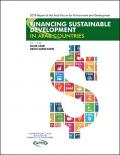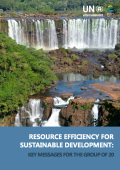
Renewable energy has advanced rapidly in the Gulf Cooperation Council (GCC) countries since 2014. The project pipeline reached almost 7 gigawatts (GW) of new power generation capacity by 2018, after the United Arab Emirates (UAE) made record-breaking bids in renewable energy auctions and Saudi Arabia made solar power cost-competitive with conventional energy technologies. Abundant resources, together with strong enabling frameworks, have led to solar PV prices of below USD 0.03 per kilowatt hour and dispatchable concentrated solar power (CSP) of USD 0.07 per kilowatt hour, which is less than some utilities in the region pay for natural gas.


This report, released the 2018 Arab Forum for Environment and Development Annual Conference, identifies financing needs, gaps, options and mechanisms for sustainable development in Arab countries, focusing on sources of finance and addressing enhancement of their roles.

Resource efficiency is a key approach to decoupling economic growth from environmental degradation while enhancing human well-being. It stimulates innovation, the creation of new industries, and boosts economic competitiveness. Ultimately, it is good not only for the environment but also for the economy.
Resource efficiency is both a requirement and an opportunity for sustained economic prosperity in G20 countries - a dynamic group of leading economies with a diverse set of visions and approaches for sustainable development, and member states all over the world. The collective impact of this group could drive large-scale transformation in a direction that can lead us to the achievement of the Sustainable Development Goals.
